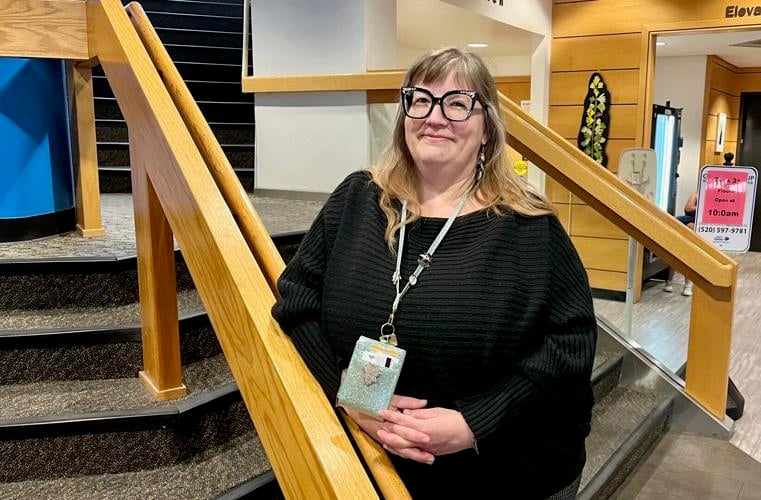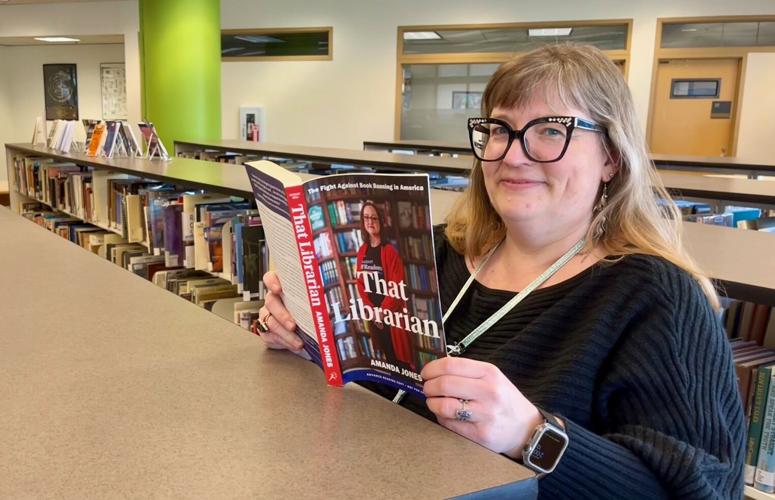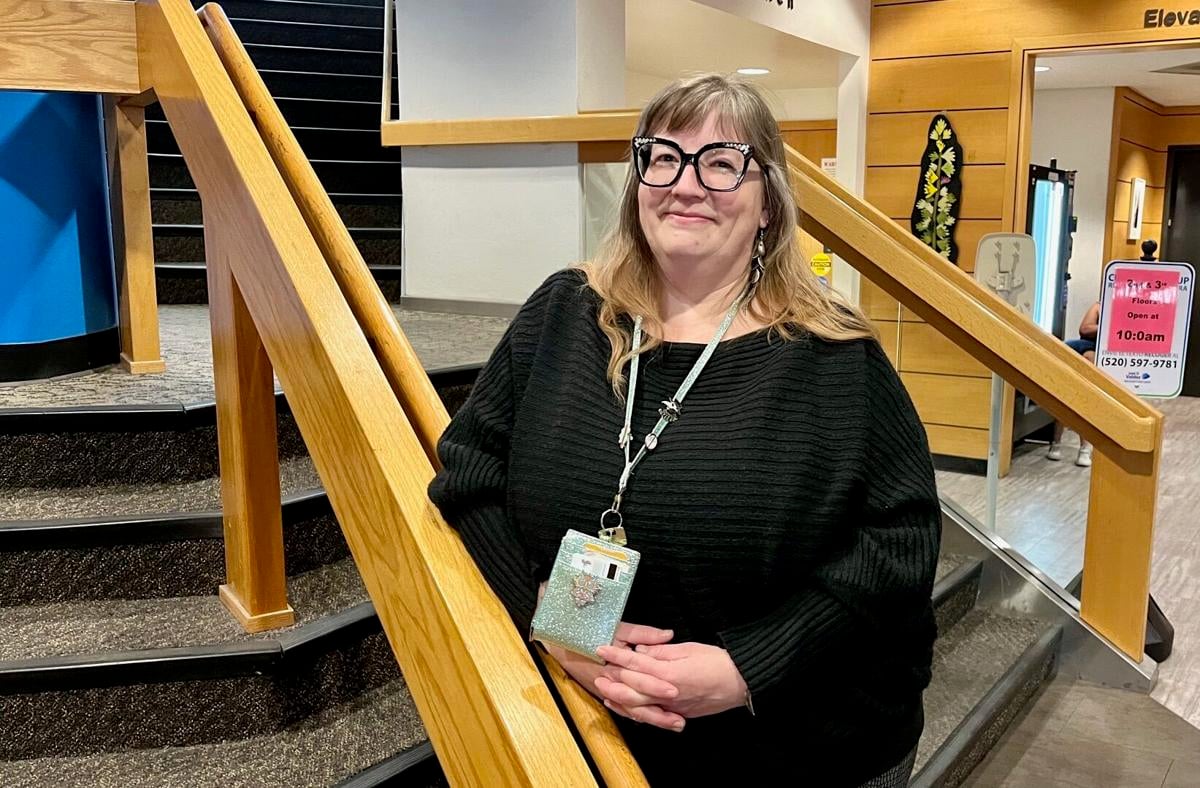It is safe to say Kate DeMeester-Lane has had a book in her hands almost every day of her life.
Judy Blume? Check. Edith Wharton and Sarah J. Maas? Check-check.
Even now, as the Library Services Manager for the Pima County Public Library, DeMeester-Lane is surrounded by books all the time, but she still needed a minute to think when asked what the title of her own story might be.
“How about ‘Just Another Librarian,’” she suggested. “I think it’s a remarkable thing I get to do, but in my world I’m not that remarkable at all. We’re all doing it. We’re doing what librarians have been doing forever.”
She is right, of course.
As much a calling as a job, librarians have gone about their business in much the same way for generations.
What’s new, and sadly ironic, is that libraries and librarians — whose motto for years had been “Shhh!” — now find themselves onstage as grandstanding politicians try to score points by removing “objectionable” books from library collections across the country.

Kate DeMeester-Lane reads “That Librarian” by Amanda Jones.
Last year alone, more than 10,000 titles were banned by various jurisdictions in the United States, 65% more than in 2022.
The modern library has become a battleground in the ongoing culture war between left and right, and DeMeester-Lane is more than an interested observer. When books are challenged here in Tucson, the buck — and the book — stop with her.
She gets the phone calls. She sees the letters. Formal challenges come to her desk first. So far, at least, the waters have remained relatively calm.
“We’ve been getting 8-10 serious challenges a year, and I can’t say any of them were frivolous,” DeMeester said last week. “I think all the ones we’ve seen are from people who are truly concerned about something they’ve heard or something they’ve read.”
The process is relatively simple. Any resident of Pima County or anyone with a Pima County Library card may submit a reconsideration request form in person or online.
All such requests are reviewed by at least two and sometimes three professional librarians, but know this in advance: the bar for a successful challenge is high.
“Our mission is to ensure access, not to judge content,” DeMeester-Lane said. “It’s not our job to tell people what they can or can’t read. If you live in Pima County, no matter who you are or what you look like, you should be able to find books and materials available for you in our library.”
Indeed, the library works hard to ensure that we do.
Earlier this year, the Pima County Board of Supervisors approved an updated Collection Development Policy. Among the desired criteria are books that represent “diverse points of view and lived experiences.”
Another: Books that represent “important movements, genres, social and historical trends.”
There are 15 criteria in all — “It’s a big net,” DeMeester-Lane agreed — and it gives library card holders a lot to choose from.
At last count, the collection included more than 1 million items. Many are controversial, some even disturbing, but there is something for almost everyone.
“When I first started out as a librarian, one of my first mentors said that if I didn’t find 10% of the collection personally offensive, I wasn’t doing my job,” DeMeester-Lane said. “Her point was that all of us have our own feelings about stuff, but the library is here for everyone.”
So far, at least, Arizona librarians have not felt the fierce stridency their contemporaries have experienced elsewhere, but DeMeester-Lane is keeping a wary eye on the horizon.
“The thing that’s interesting about where we’re at now is this idea that librarians are pushing some new, liberal agenda,” DeMeester-Lane observed last week. “We’re trying to brainwash your kids? The American Library Association’s Bill of Rights was adopted in 1939. Our Freedom to Read policy was added in 1953. We’re doing the same things now that we were doing 85 years ago.”
Still, the local librarian is often the first to fall when the political crossfire begins.
Hundreds have quietly left the field, knowing this new war about words is not what they signed up for.

Cover of “That Librarian” by Amanda Jones, who will be in Tucson on Dec. 7.
Middle-school librarian Amanda Jones of Louisiana decided to fight back after being publicly demonized by the book-banners two years ago.
Not only did Jones sue her abusers for defamation, she has since detailed the experience in a book called “That Librarian,” one of the season’s surprise hits.
For her part, DeMeester-Lane is staying put.
“When I was young, I needed a permission slip to check out ‘Super Fudge’ by Judy Blume,” DeMeester recalled. “What we’re seeing now is a whole different thing altogether, a whole different flavor of hatefulness. It’s not really about the book, it’s about the people in the book. The people who are writing the book. It’s about their right to exist in public spaces and that worries me a lot.”
FOOTNOTES
Amanda Jones, the middle-school librarian in Louisiana who decided to fight back when book-banners came after her collection two years ago, will be in Tucson Dec. 7. The author of “That Librarian,” Jones will be featured at Chapter One, a program presented by the Tucson Festival of Books. For information and tickets, visit tucsonfestivalofbooks.org.
Of the 10 books most commonly banned last year in the United States, all 10 are available at the Pima County Public Library.
U.S. Poet Laureate Ada Limón will visit Saguaro National Park East on Tuesday, Dec. 3. She will dedicate a public art tabletop honoring Tucson poet Ofelia Zepeda. The table is part of Limón’s “You Are Here” project that places poetry in National Park spaces. To learn more and RSVP for the event, call the Rincon Mountain Visitors Center at 520-733-5153.







